The Most Dangerous Music in the World is—Surprise—Made by Angry Young Men
From Greece to Mongolia, incendiary songs flourish.
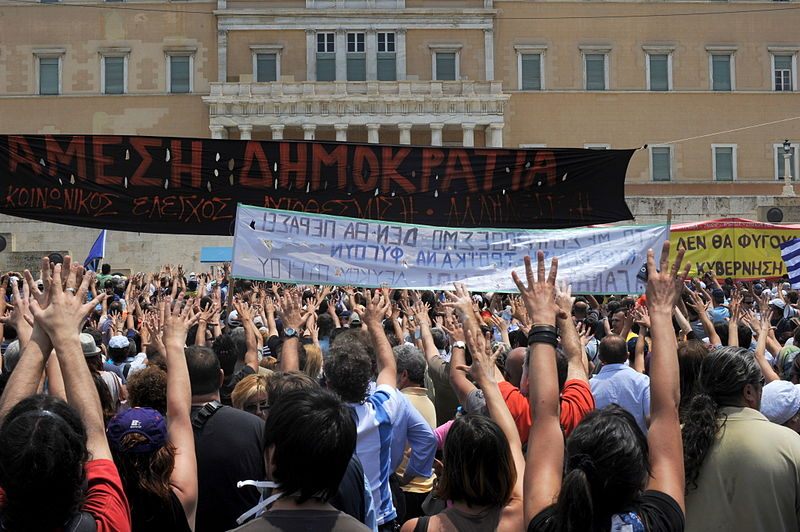
Greek protesters displaying the moutza, an insulting hand gesture, to parliament. (Photo: Ggia/WikiCommons CC BY-SA 3.0)
To their credit, the lyrics to “Speak Greek or Die,” one of the more popular songs by the Greek neo-Nazi band Pogrom, get their point across pretty clearly.
There are no ponderous metaphors or cryptic allusions to lovers past in this tune. Just this: “You speak Russian, you speak Albanian…Speak Greek or die!”
Pogrom is one of the bands promoted by Golden Dawn, the proudly fascist Greek political party that has become a not-insignificant force in Greek politics since the country’s economic implosion in 2008. (Der Sturmer is another party favorite.) “Europe’s most dangerous political force”, trumpeted the Guardian in 2015, when Golden Dawn came in third in national elections.
The drama that we’re witnessing, of course, is not new, and neither are the causes of it. Few countries have been as hobbled by the global recession as Greece; in 2013, the unemployment rate for Greeks under the age of 25 hit an astounding 62.5 percent. Add to this catastrophe the recent migrant crisis, and you have the makings of “Speak Greek or Die.”
The rise of Der Sturmer and Pogrom shows how our uses for music are infinitely adaptable. Music can bring us to ecstasy, make us long for our hearts to go on—or will us to rage. Not every voice of dysfunction is so malignant; extreme nationalism is only one example. But North and South, East and West, in the developing and developed worlds, the sound of dysfunction is being played, probably very loudly. This is music that is often dangerous to perform—and dangerous to consume.
The rap scene in Mongolia offers an example of how intense social conflict can transform music from subversive to hateful. After the collapse of the Mongolian People’s Republic in 1990, rock and rap groups sprouted up across the country. By the 2000s, however, friction with China created a market for artists with xenophobic messages. In a 2012 interview with U.S. filmmaker Lauren Knapp, the popular Mongolian rapper Gee explained his position. “I’m not racist toward anybody… except the Chinese,” said Gee. “I hate the Chinese.”
This kind of anti-Chinese and anti-foreigner sentiment taints an otherwise remarkable musical renaissance in the country, says Peter Marsh, a musicologist at Cal State-East Bay and longtime Mongolia music scene-watcher. The hostility stems from a centuries-long rivalry with Mongolia’s much-larger neighbor, and has been amplified in recent years as Chinese companies have increased their presence in the country, particularly in the mining sector, which is seen by some as polluting and exploitative. Still, “music, in all its different varieties, is a very, very important part of identity for young people today, and also an important means of expressing their wishes and desires for society,” Marsh tells me. (Indeed, Knapp’s 2014 documentary, Live from UB, offers an inspiring behind-the-scenes look at some of the country’s budding rock stars.)
Serbia’s turbo-folk is another illustrative case. A union of the kinetic beats of traditional Balkan folk music with the Eurodance synth flourishes of modern Europe, the music arose in the 1990s as Yugoslavia disintegrated. (It also probably didn’t hurt that its biggest stars have mostly been young women in low-cut dresses.) Its celebration of fancy cars and hot bodies, however, provides the dressing for somber lyrics pumping up national honor. Explaining the music to the uninitiated, a 2008 article in The Christian Science Monitor called it “the [rhythm] of Milosevic” and “the sound of Serbia feeling sorry for itself.” For many commentators, the genre’s blend of sex and jingoism is personified by the performer Ceca, the grand dame of turbo-folk and wife of Zeljko “Arkan” Raznatovic, a notorious paramilitary commander accused of war crimes during the Bosnian War.
Not all dysfunction-core, however, is nationalistic. Other genres are less interested in political cheerleading, focusing instead more on the melodrama of trying to get by in a world beset by corruption and crime. The characters in these songs aren’t traditional heroes, but poor people and bandits—and, of course, police. Probably the most familiar example of this genre is the narcocorrido, the name for Mexican drug ballads. The term comes from corridos, traditional Mexican folk songs that originated in the country’s north. Some corridos are about crime and violence, but many are simply stories about love and family.
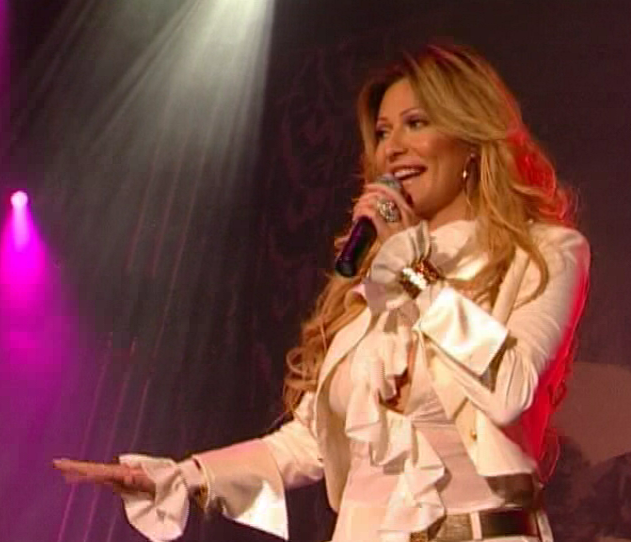
Serbian pop folk singer Ceca, who was married to Željko “Arkan” Ražnatović, a Serbian paramilitary accused of war crimes. (Photo: Kavkaz13/WikiCommons CC BY-SA 2.5)
The appeal of narcocorridos is straightforward. “If you think about it, when you played Cops and Robbers as a kid, did you ever want to be the cop? Nobody wants to be the cop,” says Elijah Wald, author of the 2001 book Narcocorrido. However, most groups that play narcocorridos don’t play them exclusively, Wald tells me. They usually sing corridos, but if they’re hired to play wedding or parties—the main gigs of most working corridistas—they may sing a few songs about drug trafficking to please their host.
Probably the world’s closest analog to narcocorridos is neomelodici, a genre popular in the Naples region among the lower class and closely associated with the Neapolitan mob.
Like narcocorridos, the subjects of neomelodici are often relationships, tragedies, and decent men driven to do bad things. As well, many neomelodici singers are hired by local patrons, some of whom have ties to organized crime. Both forms thrive within cultures that still privilege storytelling and live performance.
Whereas the most popular narcocorridistas enjoy international fandom, however, neomelodici remains a regional phenomenon. Outside of Naples, many Italians would prefer to forget about neomelodici. “The sound ignites many stereotypes,” says Jason Pine, author of the 2012 book The Art of Making Do in Naples and an anthropologist at SUNY-Purchase.
Albums range in quality from bankrolled productions to DIY bedroom projects, but the earnest, sentimental music seems to confirm “a lot about very old prejudices against the South: that it’s another Europe, another Italy, and all of the associations that are kind of attached to that label. It’s regressive, pre-modern…uncivilized, unable to establish rule of law.” The soundtrack of the 2008 Italian movie Gomorrah, which was based on an eye-opening account of the Neapolitan mafia, featured mostly neomelodici tunes.
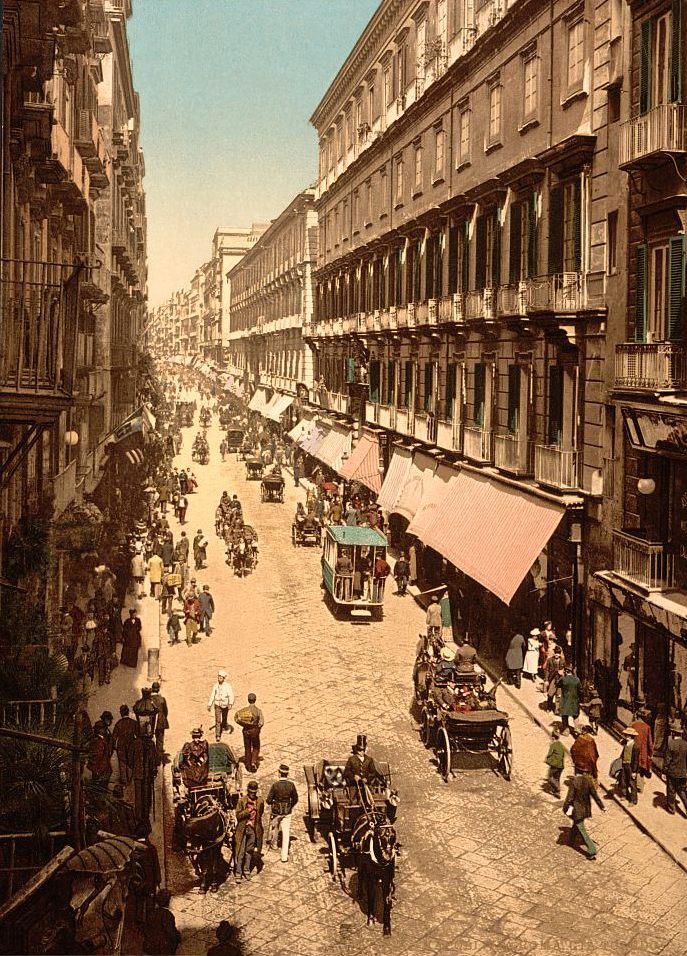 Via Roma, Naples, c. 1890. A genre known as neomelodici arose in Naples and it is closely associated with the Neapolitan mob. (Photo: Library of Congress)
Via Roma, Naples, c. 1890. A genre known as neomelodici arose in Naples and it is closely associated with the Neapolitan mob. (Photo: Library of Congress)
The mawkish lyrics and soft-rock instrumentation that characterize many neomelodici songs probably don’t bolster its appeal. Despite the baggage, Pine views neomelodici as a respectable pursuit for entrepreneurs with very few options. Wald feels the same way about narcocorridos. “One of the things that links criminals and singers is that they are two ways of making a living if you’re a poor kid from a marginal neighborhood. It’s like sports,” he says.
Still other outlaw music, like cumbia villera in Argentina, is basically gangsta rap grafted onto a traditional genre. In the case of cumbia villera, or “ghetto cumbia,” the music is a take on cumbia, the slow-and-steady tropical beat from Colombia. In the slums of Argentina—somewhat euphemistically referred to as “villas”—bands like Pibes Chorros (“the Robbing Kids”) and Mala Fama (“Infamous”) sing about drugs, girls, and guns.
What do all of these wildly different genres have in common? They’re largely the product of agitated young men. Not exclusively—turbo-folk has been dominated by women, and Knapp, the filmmaker, spent time with a trailblazing female rapper in Mongolia—but mostly. “All you have to do is look back at the U.S. during Prohibition,” Wald tells me. “Why was that the golden age of gangster movies? When crime is in the news, crime is in the news. And yeah, if you’re a young guy, action is exciting.”
That’s not to say we should despair entirely. As Pine points out, it’s complicated. One man’s crime-glorification song is another man’s ticket to local fame and respect. And music, especially rock, is sometimes credited with instigating serious political change. In fact, the 1990 book Rock around the Bloc argued that rock music played a key role in liberalizing Eastern Europe and eventually overthrowing the ruling communist regimes. According to Marsh, the same thing happened in Mongolia in 1991. “When you look back to some of the protest rallies that were taking place, and who was kind of leading these demonstrations, it was pop singers!,” says Marsh. “They were singing songs in support of democracy and protesting corruption.”
Also, many of the social issues that have produced the kinds of music discussed above aren’t exactly foreign to us. “I find it troubling in these conversations, when people ask, ‘why are Mexicans that way?’” says Wald. “They’re like ‘that’ in the same way that we’re that way.” Outlaw country and gangsta rap seem to support this. Ultimately, local dysfunction may be universally recognizable, whether we like the sound of it or not.
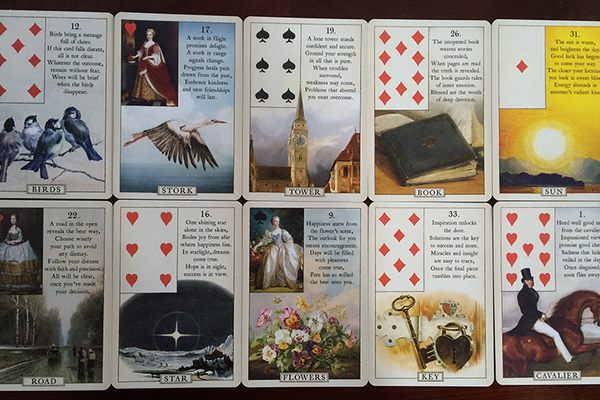




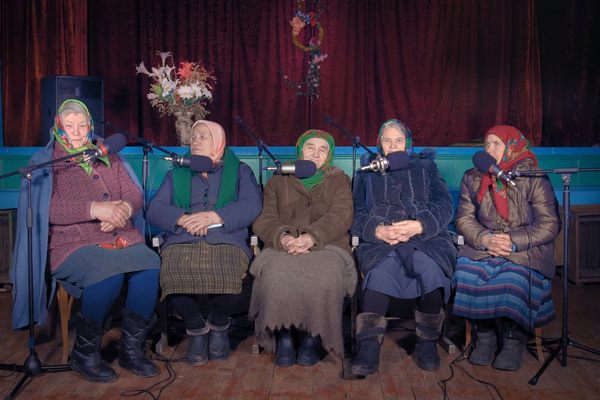






Follow us on Twitter to get the latest on the world's hidden wonders.
Like us on Facebook to get the latest on the world's hidden wonders.
Follow us on Twitter Like us on Facebook